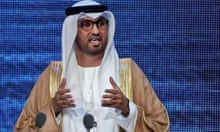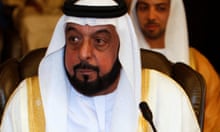The United Arab Emirates will launch its presidency of global climate talks on Thursday, with the head of its national oil company likely to be given the leading role.
Sultan Al Jaber has served as climate envoy to the country, and is chief of the Abu Dhabi National Oil Company (Adnoc), the world’s twelfth-largest oil company by production, and is hotly tipped to take on the pivotal role of president of the talks.
He is also minister of industry and advanced technology for UAE, and head of the Masdar company, which focuses on renewable energy.
The Cop28 UN climate summit, which will take place from 30 November in Dubai, will be a crucial conference, determining whether the world can get on track to tackle the climate crisis. This year, nations must conduct a “global stocktake” assessing the current state of climate action and progress on fulfilling the goals of the 2015 Paris agreement.
While some countries have submitted national plans to cut greenhouse gas emissions that are in line with the ambition in the Paris agreement of limiting global heating to 1.5C above pre-industrial levels, many of the world’s biggest emitters have failed to do so, imperilling the climate goals.
One of the roles of the presidency will be to hold such recalcitrant governments to account, but many observers fear that UAE, as a major oil producer and with close ties to other producers such as Saudi Arabia, will be reluctant to take them on.
At Cop27, held in Egypt last November, there were scores of oil and gas lobbyists from UAE, and Gulf states with strong oil and gas interests were thought to have been among the blockers preventing stronger language on phasing down fossil fuels.
One veteran of the talks, who could not be named, said: “[Al Jaber] is straddling two worlds. One of climate negotiations where we have to make a giant leap in emissions reductions and financing the move away from fossil fuel emissions; second, as head of Adnoc. UAE wants to be seen to be leading on food, technology, adaptation and potentially innovative finance but how can they carry that off while being fossil fuel polluters?”
Some civil society activists have called for Al Jaber to give up his fossil fuel roles to take on the Cop28 presidency.
Tasneem Essop, the executive director of Climate Action Network International, said: “[If Al Jaber is appointed president of Cop28, it will be] imperative for the world to be reassured that he will step down from his role as the CEO of Adnoc. He cannot preside over a process that is tasked to address the climate crisis with such a conflict of interest, heading an industry that is responsible for the crisis itself.”
She warned: “If he does not step down as CEO, it will be tantamount to a full-scale capture of the UN climate talks by a petrostate national oil company and its associated fossil fuel lobbyists. Cop26 in Glasgow had 500 fossil fuel lobbyists in attendance, the Cop in Egypt saw a 25% increase in their presence, Cop28 now seems to be open season for vested interests who will no doubt use the climate talks to continue to undermine any progress on climate action. As civil society we [will] demand that Al Jaber does the right thing and either stand aside or step down.”
after newsletter promotion
Described as charming and clever by people in climate negotiations, 49-year-old Al Jaber was educated in the US and the UK. While he helped to set up Masdar in 2006, investing heavily in solar power, his role as the national oil company’s group chief executive means he is also responsible for making as much money as possible for UAE from its oil production.
In an interview with the National newspaper in the Gulf last September, ahead of Cop27, Al Jaber made the case for a transition away from fossil fuels, but noted that oil and gas would still be needed for some years.
“Policymakers are beginning to understand that the energy transition will not happen with the flip of a switch,” he told the newspaper. “You need to maintain the current system, while the world still relies on it, and drive down its emissions, while driving up investment in new energies. Innovative climate action, which involves the fast adoption of renewable energy and other low-carbon sources, has the potential to provide long-lasting energy security. But we are not there yet.”
UAE has sought to present itself as a modernising oil producer, improving the efficiency of its production methods, and investing in renewable energy. However, many question whether even an innovative oil economy can fly the flag for the rapid phase-out of fossil fuels needed to stay within the increasingly fragile 1.5C goal.









